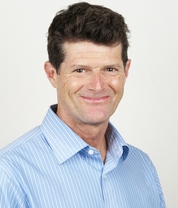
Professor Christopher Goodnow
Christopher C Goodnow holds The Bill and Patricia Ritchie Foundation Chair as Head of the Immunogenomics Laboratory at the Garvan Institute of Medical Research, and is Professor in the Cellular Genomics Futures Institute and School of Biomedical Sciences at UNSW Sydney. Chris trained in veterinary medicine and surgery, immunochemistry, and immunology at Sydney University and in DNA technology and molecular immunology at Stanford University. Previous faculty positions were HHMI Investigator at Stanford University, founding Director of the Australian Phenomics Facility at the Australian National University, and Executive Director of the Garvan Institute.
Goodnow and his team discovered the immune tolerance checkpoints controlling antibody production, which prevent autoimmune disease and target antibodies against foreign infections. He established that production of autoantibodies against self is actively prevented by B lymphocytes storing a negative signal. He discovered that these negative signals create a series of immune tolerance checkpoints, serving as fail-safes to minimize the risk of damaging autoantibody secretion while preserving the capacity to produce antibodies against infectious agents. These checkpoints allow self-reactive B cells to hypermutate their antibody genes, rapidly acquire mutations that eliminate binding to self, and evolve antibodies with exquisite specificity against foreign agents.
Goodnow’s laboratory revealed the molecular genetic wiring of the stored negative signals in B cells, providing a basis for understanding how inherited or acquired mutations lead to autoimmune diseases. In people with rheumatological autoimmunity, he showed that B cells acquiring somatic mutations corrupting the negative signal results in secretion of disease-causing rheumatoid factor autoantibodies.
Chris is now leading Hope Research – an interdisciplinary collaboration of diverse clinicians and experts in cellular genomics initiated by The Bill and Patricia Ritchie Foundation. Hope Research aims to uncover a common cause for all autoimmune disease, which include more than 100 different diseases that collectively affect one in eight people. Using single cell DNA sequencing, Chris and his team are tracking down and identifying the ‘rogue’ immune cells in the blood of adults with 44 autoimmune diseases, which drive the immune system to attack parts of the body. In turn, this is providing the rationale for clinical trials to purge the rogue cells and reset a healthy immune system.
Chris’ research contributions have been recognised by numerous awards, including The Crafoord Prize, Royal Swedish Academy of Sciences; AAI BioLegend Herzenberg Award and Distinguished Fellow, American Association of Immunologists; William E. Paul Award; GSK Award for Research Excellence; Ramaciotti Medal; Health Minister’s Prize; Centenary Medal; Gottschalk Medal; past President and Burnet Orator of the Australian & New Zealand Society for Immunology. He is a Fellow of the Australian Academy of Science, Fellow of the Royal Society, and Member of the US National Academy of Sciences.
Beyond his research endeavours, Chris enjoys spending time with his family and surfing at Sydney’s Manly Beach and on the NSW South Coast. Surfing has been a passion since his school days, and he is well known in surfing circles for leading a 1980 expedition discovering the now-famous breaks in Indonesia’s remote Mentawai Islands.
Awards
- 2025Crafoord Prize - Royal Swedish Academy of Science
- 2023American Association of Immunologists Distinguished Fellow
- 2022American Association of Immunologists - BioLegend Herzenberg Award for outstanding contributions to the field of immunology in the area of B cell biology
- 2018William E Paul Memorial Award - The Foundation for Primary Immune Diseases
- 2013Member of the US National Academy of Science
- 2012Glaxo-Smith-Kline Award for Research Excellence
- 2010NHMRC Australia Fellow
- 2010The Ramaciotti Medal
- 2009Fellow of the Royal Society
- 2007Ramaciotti Major Research Award
- 2006ARC Federation Fellow
- 2006Centenary Medal
- 2005Health Minister’s Prize for Excellence in Medical Research
- 2005ISI Highly Cited Researcher
- 2002Fellow of the Australian Academy of Science
- 2001Gottschalk Medal - Australian Academy of Science
- 1998American Association of Immunologists Pharmingen Investigator Award
- 1992Searle Scholar
- 1990Investigator of the Howard Hughes Medical Institute
- 1989Medical Foundation Postdoctoral Fellowship
- 1986NH & MRC Biomedical Research Scholarship
- 1984Honours Class I with B.V.Sc. degree; Honours Class I and University Medal with B.Sc.(Vet) degree
- 1979John Gurner and Frederick Ebsworth Prize for Biology - University of Sydney
Selected publications
See all publications- 2023Leukemia10.1038/s41375-023-01918-9
Network analysis reveals a major role for 14q32 cluster miRNAs in determining transcriptional differences between IGHV-mutated and unmutated CLL.
- 2017Acta Crystallographica. Section D, Structural Biology10.1107/S2059798317013730
Structural basis of antigen recognition: crystal structure of duck egg lysozyme.
